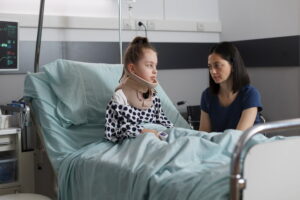How to Support Children Affected by a Car Accident

Following a terrifying car crash, most people turn their attention to the accident victim, offering an outpouring of love and support. However, what about the children of car accident victims or children involved in car accidents?
Children and adolescents may not have the emotional capacity to understand and express their emotions after a frightening event like a car accident, especially if their parent or loved one suffered significant injuries.
How Car Accidents Affect Children Emotionally
Children are still growing and evolving developmentally. They do not have the tools, life experience, or brain development to understand the impact of a traumatic event like a car accident. Studies show children involved in traffic accidents experience high levels of post-traumatic stress disorder symptoms, travel anxiety, and depression.
Children in car accidents may exhibit immediate psychological effects in the days and weeks following a crash. However, long-term emotional and psychological consequences are also common, especially in children who do not receive the emotional support and psychological help they need to process the incident and their emotions.
Recognizing Trauma Symptoms in Kids After a Car Accident
Kids and adolescents are resilient, and when they see family members struggling, they may be inclined to hide their pain to avoid putting more stress and worry on their parents or other family members. Trusted family and friends can be instrumental in helping to identify the signs of trauma in young people after a traumatic car accident and work with them and healthcare professionals to help kids cope and address their issues.
Some of the signs a child may be suffering from emotional trauma after an auto accident can include the following red flags:
- Sleep disturbances or nightmares
- Regressive behaviors
- Trouble concentrating or focusing
- Loss of interest in activities or friends
- Feelings of guilt or obsessing over guilt
- Avoiding reminders of the accident
- Disruptive or destructive behaviors
- Anxiety or increased fearfulness
- Separation anxiety
- Depression
- Strong feelings of anger or resentment
- Substance abuse
- Stomach aches or other physical symptoms of psychological trauma
Signs of trauma can vary depending on the age of the child. Younger children may respond to trauma by becoming clingier with parents or caregivers and return to behaviors like thumb-sucking for comfort or bed-wetting. School-age children and teens may lash out or turn to drugs or alcohol to help them cope with the complicated emotions brought on by the traumatic event.
Steps to Help a Child Cope After a Car Crash
As a parent, friend, or other family member, you may feel helpless watching a child suffer from the detrimental psychological effects of a car crash. However, you can take steps to support children after an accident and offer family guidance post-accident.
Consider the following:
- Be a trusted source of emotional support.
- Let your kids know you are here to listen to them without judgment.
- Ensure your children are safe and all basic needs get addressed.
- Allow them the freedom to express their feelings with words, pictures, or through play.
- Stick to a routine.
- Let them make small decisions, empowering them to feel more in control.
- Closely watch for changes in sleeping and eating patterns or changes in behavior.
- Talk to your child’s doctor or a mental health professional.
While parents want to help their children emotionally recover from an accident as soon as possible, some behaviors can cause significant setbacks for a child’s recovery. Tread carefully with these behaviors:
- Don’t push a child to discuss or relive the accident before they are ready.
- Choose your words carefully. Telling a child to be brave, tough, or to get over it can make them feel as if they aren’t being heard or their feelings are wrong.
- Don’t react with anger or punishments when a child expresses regressing behaviors they cannot control.
Resources are available in Indiana for children and families who need physical and emotional support after a traumatic incident like a motor vehicle accident. Exploring these resources is not a sign of weakness and can help families grow and recover together.
How Parents Can Support a Child’s Emotional Recovery
You can support a child’s emotional recovery by being there for them and showing that you are a source of comfort, support, and unconditional love. Start by being an active listener. It can be challenging to find the right words to communicate effectively with children, especially those struggling to come to terms with a traumatic event. Sometimes, the best thing you can do to support your child is to stop talking and be a present listener. Let them speak and express themselves in an environment free from judgment, fear, and shame.
It is also vital to respect their privacy and boundaries. Do not force them to discuss the incident before they are ready. Try to provide positive reinforcement and encouragement. Let them know you are there for them and will listen when they are ready to talk. Acknowledge how they feel and that you respect their boundaries. This type of support shows that you give them some control over the situation and are a safe source of comfort and help when needed.
Long-Term Recovery Tips for Children Impacted by Car Accidents
Trauma recovery for children varies from person to person. No one recovery journey is the same as someone else’s. It takes time to process a traumatic event and find the tools and support to overcome emotional struggles. However, if your child shows significant signs of stress, depression, anxiety, or destructive behaviors, or if they are still struggling emotionally after one month, it is time to seek professional help.
Supporting long-term recovery can mean seeking outside help in the form of mental health services and caregivers. Talk to your child’s physician or your child’s school. Both can point you toward additional help and resources to support your child. Many kids benefit from speaking with a neutral third party, like a counselor or psychologist, who can help them understand the accident and how they feel and express emotions.
Get Legal Help from Our Car Accident Lawyers Now
At Craig, Kelley & Faultless LLC, our Indiana car accident lawyers are passionate about helping you and your family recover financially and emotionally following a traumatic crash. Our sensitive personal injury lawyers are ready to provide you with support, resources, and personalized legal guidance during this challenging time.
Contact our office today and arrange a free consultation about how our law firm can help your family after a motor vehicle accident.


